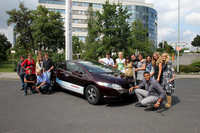Honda Demonstrates FCX Clarity at European Youth Parliament's International Session - VIDEO ENHANCED
 Honda FCX Clarity |
FRANKFURT - August 7, 2010:Honda is working with the European Youth Parliament to support its 64th International Session, taking place in Frankfurt, Germany between 30th July and 8th August. On Tuesday, a representative from Honda Motor Europe took part in an “expert hearing”, giving members of the Committee on Transport and Tourism (TRAN) a chance to learn about Honda’s environmental technology and to discuss the subject of sustainable mobility.
Members of TRAN were also offered the unique opportunity to ride in the FCX Clarity, Honda’s zero emission hydrogen fuel cell electric vehicle. The FCX Clarity emits no CO2, nor any other harmful emissions…the only emission is water. This experience provided the delegates of the European Youth Parliament a chance to see this revolutionary vehicle in action and to encourage them to consider the potential that fuel cell technology has to become a personal mobility solution in the post-petrol era.
Presenting to TRAN, Jane Gordon, European Public Affairs, Honda Motor Europe commented, “Today’s event highlighted the many challenges society faces across the globe to achieve sustainable mobility. Honda is keen to work with organisations such as the European Youth Parliament, to demonstrate the active part that our new technologies can play in providing solutions to these issues.”
Click PLAY to watch Honda FCX Clarity technology video
About the FCX Clarity & Hydrogen Fuel Cell Electric Vehicles
Over one hundred years have passed since the birth of the automobile. As we look for better ways to create and harness energy for transportation, Honda remains focused on creating sustainable mobility. We are looking toward the next hundred years and exploring the challenge of new fuels and powerplants. We’re working to keep the dream of personal mobility alive for generations yet to come. Fuel cell electric vehicles, which run on hydrogen and emit no CO2 or other harmful emissions, may be the key to securing a bright future for the automobile in society.A fuel cell vehicle has a hydrogen tank instead of a petrol tank. In the fuel cell, hydrogen is combined with atmospheric oxygen to generate electricity. No CO2 or other pollutants are emitted in this process. The only emission is water. A compact and efficient lithium ion battery stores electricity generated during braking and deceleration in regenerative braking. The battery works in concert with the fuel cell stack to power the vehicle. Because the vehicle is propelled by an electric motor, it delivers smooth, powerful acceleration and quiet operation, without the noise and vibration associated with an internal combustion engine. It is the ultimate in clean performance.
In an ideal hydrogen cycle, hydrogen produced from water via electrolysis using solar, wind, hydroelectric and other renewable energy sources would be used in fuel cells to generate electricity for use in cars and to meet other energy needs. The water produced as a by-product of this process would then return to the rivers and oceans before once again being converted into hydrogen via electrolysis. By realising such a renewable, water-to-water energy cycle, it may be possible one day to create truly sustainable energy supplies, freeing society from dependence on non-renewable and carbon-based energy sources.
About the European Youth Parliament
The European Youth Parliament (EYP) is a unique forum with the aim of
involving young people to actively take part in Europe’s development.
Every year, thousands of people from over thirty different European
countries gather to discuss global issues. While developing their
inter-personal, analytical and language skills the delegates are also
introduced to the vast cultural diversity of Europe.
Today, EYP is one of the largest European platforms for intercultural exchange as well as debate and education.
Every year, three International Sessions of the European Youth Parliament take place in different European countries. The 64th International Session will be held in Frankfurt, Germany. 250 teenagers, aged between16 and 20 years old, from 33 European countries will take part. The young delegates will exchange ideas and visions of Europe’s future and make friends across borders. They will discuss current topics of European politics and draft resolutions, which will then be debated according to the rules of the European Parliament.



